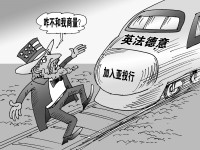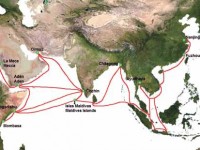
Pang Zhongying, Professor, Renmin University
Apr 01, 2015
The move by China to create the AIIB doesn’t imply intention to control the bank; instead it is an attempt to enhance its “soft power,” while avoiding typical international norms of competing for hegemony. Europe’s participation has rendered the AIIB international credibility; yet China is wary that the new institution is already over-politicized even before its official launch and operation.

Michael Billington, Asia Specialist, Executive Intelligence Review
Mar 27, 2015
In October 2013, during a visit to Indonesia, Chinese President Xi Jinping announced the launching of the New 21st Century Maritime Silk Road, just one month after announcing the New Silk Road Economic Belt, while on a visit to Kazakhstan. These two initiatives, followed in 2014 by the plan to put together the BRICS New Development Bank and China’s establishment of the Asian Infrastructure Investment Bank that Fall, constitute a new paradigm for mankind.
Chen Xiangyang, Director and Research Professor, CICIR
Mar 23, 2015
The Third Session of the 12th National People’s Congress delivered a “Report on the Work of the Government.” Notable advancement was made in conducting economic diplomacy with the Silk Road Economic Belt, 21st Century Maritime Silk Road initiatives, the Asian Infrastructure Investment Bank, and Silk Road Fund. More significant openness to the outside world and expanded economic diplomacy are priorities of diplomatic work in 2015.
Vasilis Trigkas, Visiting Assistant Professor, Schwarzman College, Tsinghua University
Feb 12, 2015
A Greek exit from the EU would lead to increased instability in Europe. Yet, it may present opportunity for China, the U.S. EU, and IMF to engage together in a summit to safeguard the stability of the Eurozone and shape a global norm on tax evasion and tax heavens that have adversely affected insolvent states like Greece.
Ben Reynolds, Writer and Foreign Policy Analyst in New York
Jan 22, 2015
Strained relations between the Uyghur community in Xinjiang and the Chinese government have led to increasing instability, which hinders China’s larger goals to increase trade with Central Asia and the Middle East. China's New Silk Road strategy may provide an opportunity for the CCP and Uyghur leaders to strike an uneasy bargain, albeit one that can halt the cycle of repression and retaliatory violence.
Chen Xiangyang, Director and Research Professor, CICIR
Dec 31, 2014
Speaking at the recent Central Conference on Work Relating to Foreign Affairs, Xi Jinping spelled out China’s new foreign-policy vision, which many have characterized as a diplomatic manifesto to secure the “Chinese dream”.

Zhai Kun, Professor at School of International Studies; Deputy Director of Institute of Area Studies, Peking University
Nov 12, 2014
China’s “One Belt, One Road” strategy is Xi’s new scheme to effectively interconnect the trade routes between China and the rest of the world. The United States need not consider it a hegemonic challenge, but rather work to collaborate in the region’s common development.
Michal Meidan, Director, China Matters
Oct 09, 2014
Reflecting on the recent joint naval exercises between Iran and China, Michal Meidan explores how the strategic relationship between the two nations involves more than just oil and discusses how US-led sanctions against Iran continue to complicate geopolitics.
Shao Yuqun, Director, Institute for Taiwan, HK and Macau Studies, Shanghai Institutes for International Studies
Feb 24, 2014
Shao analyzes the US’ “New Silk Road Initiative” and China’s “Silk Road Economic Belt,”and concludes that though having differences, they go in the same direction: acceleration of regional economic cooperation.
Zhai Kun, Professor at School of International Studies; Deputy Director of Institute of Area Studies, Peking University
Feb 19, 2014
Following the first year of the new Chinese leadership’s time in power, Zhai Kun examines why tensions in the Asia-Pacific continue to increase and what can be done to promote regional stability and development without endangering the current US-China relationship.
Back to Top

- China-US Focus builds trust and understanding between the U.S. and China through open dialogue among thought leaders.
- Our Offerings
- Topics
- Videos
- Podcasts
- Columnists
- Research Reports
- Focus Digest
- Stay Connected
-
Thanks for signing up!
- Get the latest stories from China-US Focus weekly.